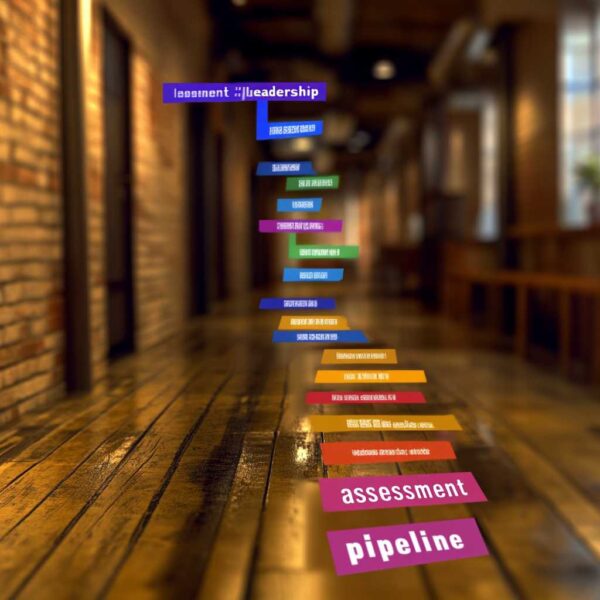Leadership is the cornerstone of every successful organization. From fostering innovation to guiding teams through complex challenges, strong leaders inspire and drive progress.
But how do you ensure your organization identifies, nurtures, and empowers the right leaders? The answer lies in Leadership Assessment.
In this comprehensive guide, we’ll delve into the world of leadership assessments—what they are, why they matter, and how they can transform your organization.
What is Leadership Assessment?
A Leadership Assessment is a systematic process that evaluates an individual's leadership qualities, competencies, and potential. These assessments measure critical areas such as decision-making, emotional intelligence, adaptability, and strategic thinking.
Leadership assessments can be tailored to suit organizational needs, offering actionable insights that help organizations identify current and future leaders, align their skills with business goals, and foster a culture of continuous improvement.
Explore our leadership assessments:
Why Leadership Assessment Matters
Effective leadership impacts every level of an organization, from employee engagement to financial performance. Here’s why investing in leadership assessment is crucial:
1. Identifying High-Potential Leaders
Leadership assessments help uncover individuals with the potential to excel in leadership roles, ensuring a strong succession pipeline.
2. Improving Decision-Making
By evaluating critical thinking and problem-solving abilities, these assessments ensure leaders can make informed and impactful decisions.
3. Enhancing Team Collaboration
Assessments provide insights into leadership styles, enabling better alignment with team dynamics.
4. Fostering Organizational Growth
Strong leaders drive innovation, improve team performance, and align their vision with the organization’s goals.
5. Preparing for the Future
Leadership assessments equip organizations with adaptable leaders ready to tackle future challenges.
Types of Leadership Assessments
To build a strong leadership pipeline, it’s essential to choose the right type of assessment tailored to your organizational needs. Here are ten proven leadership assessments, each addressing specific aspects of leadership potential and performance.
1. Leadership Predictor Profile Test by The Hire Talent
The Leadership Predictor Profile evaluates candidates across dimensions like cognitive ability, competencies, and personality traits. This comprehensive tool helps HR professionals and executives assess leadership potential for promotions or new hires.
When & Why Use This Assessment:
Use this tool during hiring to evaluate a candidate’s leadership aptitude comprehensively. It’s particularly effective for building long-term leadership pipelines.
Expert Tip:
Pair this tool with structured feedback sessions to align assessment outcomes with actionable leadership development plans.
2. DISC Personality Test
The DISC Personality Test categorizes individuals into Dominance, Influence, Steadiness, or Compliance, offering insights into their behavioral tendencies and communication styles. It is ideal for understanding how personality traits influence leadership approaches.
When & Why Use This Assessment:
Best used to enhance team dynamics or during leadership onboarding programs. It helps match leadership styles with team needs for optimal performance.
Expert Tip:
Don’t rely solely on this tool. Combine it with situational judgment assessments to validate results and ensure a holistic evaluation.
3. Big 5 Personality Test
The Big 5 Personality Test evaluates five dimensions: openness, conscientiousness, extraversion, agreeableness, and neuroticism. These traits strongly correlate with leadership styles and effectiveness.
When & Why Use This Assessment:
Ideal for identifying transformational leaders or evaluating leadership development program participants.
Expert Tip:
Focus on extraversion and openness for innovation-driven roles, but ensure you match leaders’ traits with team expectations to minimize friction.
Explore our Big Five Personality Test
4. Integrity Test by The Hire Talent
Integrity is a cornerstone of effective leadership. The integrity test evaluates honesty, reliability, and work ethics, offering insights into a candidate’s trustworthiness and ability to build strong professional relationships.
When & Why Use This Assessment:
Use this tool during pre-employment screening or when promoting employees to leadership roles where ethics are critical.
Expert Tip:
Integrate this test into your overall hiring process to ensure alignment with your organization’s values.
5. Leadership Style Assessment
Leadership styles significantly impact team dynamics and performance. Tools like the Leadership Style Matrix help assess if candidates lean toward democratic, autocratic, laissez-faire, or transformational leadership.
When & Why Use This Assessment:
Use this during leadership coaching or when assigning leaders to specific teams with unique needs.
Expert Tip:
Tailor training programs to refine leadership styles based on assessment results, focusing on flexibility and adaptability.
6. Structured Interviews
Structured interviews involve standardized questions that evaluate candidates’ responses against pre-defined benchmarks, making them one of the most reliable predictors of leadership potential.
When & Why Use This Assessment:
Best used during the final stages of recruitment or internal promotions to evaluate leadership-centric behavioral competencies.
Expert Tip:
Use a mix of situational and behavioral questions to assess candidates’ real-world problem-solving and leadership capabilities.
Explore our interview guides feature
7. Simulations
Leadership simulations place candidates in real-world scenarios, evaluating their decision-making, collaboration, and problem-solving skills under pressure.
When & Why Use This Assessment:
Ideal for high-stakes roles or when preparing leaders for major organizational changes.
Expert Tip:
Create industry-specific simulations to test skills relevant to your organization’s unique challenges.
8. Direct Observations
Directly observing candidates in their day-to-day roles offers a unique perspective on their leadership potential, highlighting qualities like initiative, empathy, and decision-making.
When & Why Use This Assessment:
Best used for internal promotions or leadership development programs when you have consistent interaction with candidates.
Expert Tip:
Combine observations with structured assessments for a balanced evaluation of qualitative and quantitative attributes.
9. 360-Degree Leadership Assessment
For a well-rounded evaluation of leadership capabilities, the 360-Degree Leadership Assessment provides valuable feedback from peers, subordinates, and supervisors. It helps leaders understand how they are perceived and identify areas for improvement, fostering growth from multiple perspectives.
When & Why Use This Assessment:
Use this assessment when you want comprehensive feedback from all organizational levels. It’s especially valuable during performance reviews, team restructuring, or as part of leadership development programs.
Expert Tip:
Ensure anonymity in feedback collection to promote honesty. This creates a safe space for colleagues to share genuine insights, leading to more actionable feedback.
10. Leadership Competency Assessment
Assessing key leadership competencies like decision-making, strategic thinking, and emotional intelligence is crucial for identifying potential leaders. The Leadership Competency Assessment helps you evaluate these skills effectively and align them with organizational goals.
When & Why Use This Assessment:
Ideal for identifying emerging leaders or evaluating candidates for promotions. It also works well for succession planning by uncovering strengths and gaps in your leadership bench.
Expert Tip:
Pair competency assessments with tailored development programs to address identified gaps. Focus on both technical and interpersonal competencies for a balanced leader.
11. DISC Leadership Assessment
Every leader communicates and interacts differently, which makes understanding behavioral tendencies critical. The DISC Leadership Assessment offers insights into leaders’ communication styles, enabling them to foster better relationships and teamwork.
When & Why Use This Assessment:
Use this tool when improving team dynamics or enhancing cross-departmental collaboration. It’s also great for new leaders seeking to build rapport with their teams.
Expert Tip:
Share DISC profiles with team members to improve communication and mutual understanding. Knowing how others work can lead to fewer conflicts and stronger collaboration.
12. Situational Leadership Assessment
Leadership isn’t one-size-fits-all. The Situational Leadership Assessment evaluates how well leaders adapt their approach based on the needs of their teams and specific challenges.
When & Why Use This Assessment:
Perfect for evaluating leaders in dynamic environments or during times of organizational change. It’s also helpful for project-based roles where flexibility is key.
Expert Tip:
Encourage leaders to reflect on past decisions during the assessment. This real-life context helps them recognize areas where they excel and where they need to adapt.
13. Inclusive Leadership Assessment
Creating inclusive work environments is more important than ever. The Inclusive Leadership Assessment focuses on evaluating a leader’s ability to promote diversity, equity, and collaboration within their teams.
When & Why Use This Assessment:
Use this assessment when diversity and inclusion are central to your organizational goals. It’s also ideal for identifying leaders who can foster innovation through diverse perspectives.
Expert Tip:
Incorporate cultural competency training alongside this assessment to enhance leaders’ ability to manage diverse teams effectively.
14. Transformational Leadership Assessment
Visionary leaders who inspire change are the backbone of successful organizations. The Transformational Leadership Assessment identifies leaders capable of driving innovation, motivating teams, and fostering a culture of continuous improvement.
When & Why Use This Assessment:
Ideal for organizations embarking on significant change initiatives or innovation-driven strategies. It’s also valuable for assessing leadership potential in growth-focused roles.
Expert Tip:
Look for leaders with a balance of emotional intelligence and strategic vision—they’re more likely to inspire sustained change and innovation.
15. Leadership Development Assessment
Developing leadership potential requires targeted feedback. The Leadership Development Assessment highlights growth opportunities and provides actionable insights to support leaders’ long-term development.
When & Why Use This Assessment:
Use this tool as part of ongoing leadership training programs. It’s particularly useful for mid-level managers aspiring to senior roles.
Expert Tip:
Regularly revisit assessment results to track progress and adjust development plans as leaders grow within your organization.
16. Executive Leadership Assessment
For senior roles, high-level competencies like strategic vision and stakeholder management are key. The Executive Leadership Assessment evaluates these advanced skills, ensuring your organization’s top leadership positions are filled by the right candidates.
When & Why Use This Assessment:
Deploy this assessment during executive hiring or to evaluate succession candidates for C-suite roles.
Expert Tip:
Combine this assessment with external benchmarking to identify how your leadership team measures up to industry standards.
17. Leadership Skills Assessment
Strong leadership hinges on core skills like communication, conflict resolution, and problem-solving. The Leadership Skills Assessment identifies skill gaps and supports tailored development initiatives to strengthen these essential abilities.
When & Why Use This Assessment:
Use this for all levels of leadership to ensure foundational skills are strong. It’s especially effective for new leaders or during onboarding programs.
Expert Tip:
Focus on building soft skills such as empathy and active listening—these are just as critical as technical capabilities in driving team success.
18. Leadership Readiness Assessment
Is your team prepared for future challenges? The Leadership Readiness Assessment determines whether individuals have the mindset, skills, and potential to take on leadership roles, helping you plan for seamless transitions.
When & Why Use This Assessment:
Best used during succession planning or when preparing high-potential employees for critical leadership positions.
Expert Tip:
Pair readiness assessments with mentorship programs to give potential leaders the real-world exposure they need to succeed.
How to Implement Leadership Assessments
Step 1: Define Leadership Goals
Establish the qualities and skills your organization values in leaders. Align these criteria with your business objectives.
Step 2: Choose the Right Tools
Select assessments tailored to your needs, such as 360-degree feedback or situational judgment tests.
Step 3: Conduct Assessments
Engage participants in the assessment process and ensure confidentiality to encourage honest feedback.
Step 4: Analyze Results
Use comprehensive reporting to identify strengths, weaknesses, and growth opportunities for participants.
Step 5: Develop Action Plans
Create personalized development plans based on assessment results, linking them with leadership training programs.
Step 6: Monitor Progress
Reassess periodically to measure growth and ensure alignment with organizational goals.
Expert Recommendations for Leadership Assessments
- Combine Tools for Comprehensive Insights
Use a mix of assessments like 360-degree feedback, psychometric tests, and situational judgment tests for a well-rounded evaluation. - Link Assessments to Training Programs
Integrate assessments with leadership development initiatives to address identified gaps. - Foster a Feedback Culture
Encourage open communication about assessment results to create a supportive environment for growth. - Leverage Technology
Use digital platforms to streamline assessments and gain actionable insights through data analytics.
FAQs About Leadership Assessments
1. What is the purpose of a leadership assessment?
It identifies leadership potential, evaluates competencies, and helps organizations align leadership capabilities with business goals.
2. How do leadership assessments support succession planning?
They provide insights into the readiness and potential of employees, ensuring a seamless transition for key roles.
3. Can leadership assessments improve team performance?
Yes, by aligning leadership styles with team needs, assessments enhance collaboration and productivity.
4. How often should leadership assessments be conducted?
Annually or during significant organizational changes to ensure alignment with evolving goals.
5. Are leadership assessments suitable for all levels?
Absolutely! They can be tailored for emerging leaders, mid-level managers, and senior executives.
Transform Your Leadership Strategy Today
Effective leadership is the backbone of a thriving organization. Leadership assessments empower businesses to build strong leadership pipelines, enhance team performance, and achieve strategic goals.
Ready to unlock the potential of your leaders? Explore our Leadership Tests or schedule a demo with our experts today!
Empower your organization to thrive with leaders ready to take on tomorrow’s challenges.







